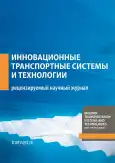Maturity matrix of digital lean manufacturing
- Authors: Vagin S.S.1, Palkina E.S.1
-
Affiliations:
- State Marine Technical University
- Issue: Vol 11, No 3 (2025)
- Pages: 434-449
- Section: Original studies
- URL: https://journal-vniispk.ru/transj/article/view/328154
- DOI: https://doi.org/10.17816/transsyst688686
- ID: 328154
Cite item
Full Text
Abstract
AIM. The aim of this study is to develop and justify a maturity matrix for digital lean manufacturing, reflecting the phased integration of digitalization and lean production tools under conditions of industrial digital transformation. Special attention is given to the application of the maturity matrix in high-tech sectors of transport engineering.
MATERIALS AND METHODS. The study is based on a phased approach to the classification of digitalization and lean manufacturing tools. Methods employed include comparative analysis, expert evaluation, logical-structural modeling, and matrix diagnostics. The assessment was carried out using a four-phase implementation model, ranging from basic realization to strategic transformation.
RESULTS. A maturity matrix for digital lean manufacturing has been developed, comprising 16 cells, each representing the degree of implementation of digital lean tools at a specific phase. The matrix makes it possible to identify maturity gaps and inconsistencies between lean and digital trajectories, and to design individualized development paths for production systems.
CONCLUSION. The proposed tool can be used for self-assessment of maturity levels both at the enterprise level in transport engineering and in industry more broadly. It supports the development of transformation roadmaps and strategic management of digital and organizational changes. The application of the matrix facilitates the coordinated and balanced development of digital lean manufacturing.
Full Text
##article.viewOnOriginalSite##About the authors
S. S. Vagin
State Marine Technical University
Author for correspondence.
Email: vaginms@yandex.ru
ORCID iD: 0009-0002-3833-4623
SPIN-code: 3582-4226
Applicant
Russian Federation, St. PetersburgE. S. Palkina
State Marine Technical University
Email: elena_palkina@hotmail.com
ORCID iD: 0000-0002-4702-3512
SPIN-code: 8447-6777
Dr. Sci. (Economics), Associated Professor
Russian Federation, St. PetersburgReferences
- Khu T. National strategies for transition to Industry 5.0 (Obzor natsional'nykh strategii perekhoda k Industrии 5.0). Economics and Innovation Management. 2022;(3):28–38. doi: 10.26730/2587-5574-2022-3-28-38
- Manish. What Is Digital Lean Or Lean 2.0 In VUCA world? Learn Transformation [Internet]. 2023 Aug 24 Accessed: 2025 May 4. Available from: https://learntransformation.com/lean-2-0/
- Powell DJ, Romero D. Digital Lean Manufacturing: A Literature Review. In: Proc. IEEE Int. Conf. on Industrial Engineering and Engineering Management (IEEM); 2021 Dec 13–16; Singapore. IEEE; 2021. Available from: https://www.researchgate.net/publication/357968752
- Kokh LV, Kokh YV. Digital transformation of the production system in shipbuilding: problems and solutions. Science and Technology Bulletin of SPbPU. Economics. 2019;12(4):78–89. doi: 10.21209/2227-9245-2021-27-6-107-123 EDN: BVGBAN
- Palkina ES. Risks of digital transformation of transport logistics in priority market segments. E3S Web of Conferences. 2023;371:04047. doi: 10.1051/e3sconf/202337104047 EDN: TYGRVQ
- Glukhov VV, Babkin AV, Shkarupeta EV. Digital strategizing of industrial systems based on sustainable eco-innovative and circular business models during the transition to Industry 5.0. Economics and Management. 2022;28(10):1006–1020. doi: 10.35854/1998-1627-2022-10-1006-1020 EDN: JDJSWV
- Shafieva ET, Khachidogov RA. Main stages of digital transformation of the national economy. Journal of Applied Research. 2021;5(2):142–147. doi: 10.47576/2712-7516_2021_5_2_142 EDN: GUYNVU
- Rossini M, Cifone FD, Kassem B, Costa F, Portioli-Staudacher A. Being lean: how to shape digital transformation in the manufacturing sector. J Manuf Technol Manag. 2021;32(9):239–259. doi: 10.1108/JMTM-12-2020-0467 EDN: UXPVIY
- Belysh KV. Classification of the main methods and tools of lean production. RUDN Journal of Economics. 2016;(1):70–77.
- Sakhnovich TA. Lean production tools. In: Proceedings of the 19th Int. Sci. and Tech. Conf. Minsk: BNTU; 2022. p. 150–155.
- Valinurova LS, Mazur NZ. Digital tools for enterprise management. Innovations and Investments. 2023;(6):459–464.
- Kolychev VD, Belkin IO. Integration of lean production and digital technologies in the operational management of industrial enterprises. Higher Education Institutions Proceedings. Economics, Finance and Production Management. 2023;3(57):45–58. doi: 10.6060/ivecofin.2023573.653 EDN: UAWLCH
- Glukhov VV, Balashova ES. Production organization. Lean Production: Textbook. St. Petersburg: Polytechnic University Press; 2007. 251 p.
- Flek MB, Ugnich EA. Enterprise management in the context of digital transformation. Rostov-on-Don: DSTU; 2020. 235 p.
- Treviño-Elizondo BL, García-Reyes H, Peimbert-García RE. A maturity model to become a smart organization based on lean and industry 4.0 synergy. Sustainability. 2023;15:13151. doi: 10.3390/su151713151 EDN: NRJWUQ
- Vaz N. Digital Business Transformation. How Established Companies Sustain Competitive Advantage from Now to Next. Wiley; 2021.
- Borovkov AI, Gamzikova AA, Kukushkin KV, Ryabov YA. Digital twins in high-tech industry: Summary report. St. Petersburg: Politek-Press; 2019. 62 p.
- Kumar V, Rezaei J, Akberdina V, Kuzmin E, eds. Digital Transformation in Industry: Trends, Management, Strategies. Lecture Notes in Information Systems and Organisation. Vol. 44. Cham: Springer; 2021. doi: 10.1007/978-3-030-73261-5 EDN: BNTNXN
- Kobzev VV, Babkin AV, Skorobogatov AS. Digital transformation of industrial enterprises in the new reality. π-Economy. 2022;15(5):7–27. doi: 10.18721/JE.15501 EDN: NUNQPQ
- Babkin AV, Shkarupeta EV, Plotnikov VA. Intellectual cyber-social ecosystem of Industry 5.0: concept, essence, model. Economic Revival of Russia. 2021;(4):39–62. doi: 10.37930/1990-9780-2021-4-70-39-62 EDN: TCYAIR










